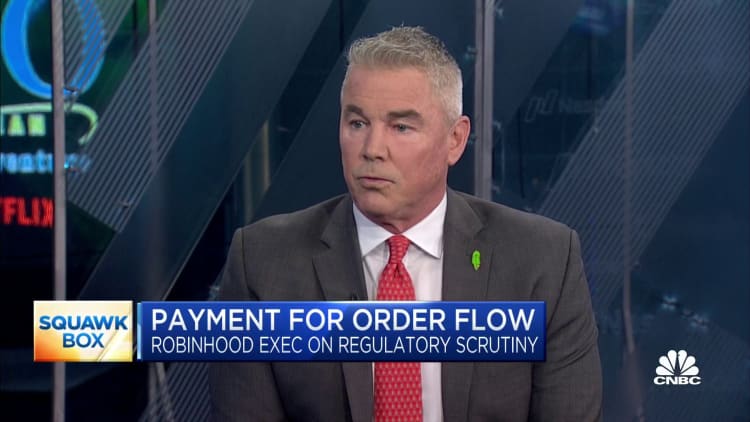Robinhood, the brokerage firm best known for its role in bringing a new generation of retail investors into the market, launched an index last Friday showing the 10 most popular stocks with its brokerage account holders. Some of the names don't surprise: Tesla, for example. But to match the EV "fanboy" stock, there was also a blue-chip auto in the top 10: Ford. And for the media "meme stock" in the top 10, AMC (which made it twice, with its common and preferred shares), there was also a legacy S&P 500 name: Disney.
The new generation of retail investors is here to stay. Data provided to CNBC by Broadridge Financial Solutions shows that even as the market transitioned from the Covid bull to 2022's bear market, retail investors have not cut and run. According to the data, there are some behavioral changes consistent with past recessions, including the dotcom bubble and 2008: investors initiate fewer new positions during downturns, but they don't bail on the market once they are in it.
"They might not be increasing, and if you owned Apple, you might not go out and buy Netflix, but you don't liquidate," said Broadridge CFO Edmund Reese.
Stock and fund positions didn't go fully to negative growth across those previous bear market periods, and that's holding true now too, and holding up even better than Broadridge expected.
Its data shows that 2021 growth in stock and fund positions of 26% couldn't be sustained, but in fiscal 2022, the 18% growth rate exceeded Broadridge expectations for more "moderate" growth, according to Reese.
"Despite the market volatility, we continued to see investors coming into the market," he said.

And that leads to a question for companies that traditionally focus on the largest institutional investors but are now finding more discussion about businesses and stocks on platforms like Reddit and Twitter: how to engage with retail shareholders.
Reese is doing more outreach to retail shareholders of his company, and on Thursday, Chevron CFO Pierre Breber and the energy company's IR team will be hosting its first digital "fireside chat" with retail investors.
Historically, there was not a good way to hold the equivalent of institutional meetings with retail shareholders, but digital communication platforms offered by Broadridge and Robinhood's own investor communications subsidiary, Say Technologies (Chevron's partner), are being adopted broadly for annual shareholder meetings and proxy votes, leading to greater scale and cost efficiencies. That translates into more opportunities to adopt the technology for additional forms of shareholder engagement. In 2019, 300 companies conducted virtual shareholder meetings through Broadridge. That figure reached 2,500 in fiscal 2022, and 90% of the S&P 100. It also logged five million retail positions voting on proxy measures through its mobile voting app.
The exact numbers on retail shareholder bases, company-by-company, are hard to pin down. For most, the dominant passive index funds managers, including BlackRock, State Street Global Advisors and Vanguard, comprise a hefty portion of their shareholder base, followed by other institutions, from active managers to pensions and endowments.
And when it comes to retail, "it's a black box," says Zach Hascoe, co-founder and chief commercial officer of Say, which was acquired by Robinhood in August 2021.
But retail shareholders can make up 10% to 15% of a company's investor base, according to Broadridge, and with digital tools making it much easier to identify these shareholders and reach them at scale, it's an opportunity that more companies are choosing to explore.
Broadridge made its own IR team one of the first test cases for retail shareholder calls when it hosted retail investors in August on a webcast. Reese says one of the differences the company noted in dialogue with retail investors as compared to quarterly earnings calls was a focus on broader business issues.
"You hear retail investors asking about ESG, about culture and leadership," Reese says. "Engaging with retail gives you the opportunity to talk about those things."
Meme stock phenomenon aside, retail investors are for the most part "passionate buy and hold investors," according to Hascoe, and the questions they tend to ask through Say's platform are mostly focused on long-term business issues including new products, global expansion and partnerships.
"There was a perception they are not educated, and it is low ROI to engage with them, and that has shifted. Retail has more access to information, and they are more engaged and educated," he said.
Chevron, as well as relationships Say has with U.S. Steel and Howard Hughes Corporation, speak to how more companies from the old guard are moving into closer contact with retail.
"Individual investors—which are a large and important part of our shareholder base—haven't traditionally had a platform to engage directly with Chevron's leadership," said Roderick Green, Chevron's head of investor relations in a release announcing the new Q&A series. "This approach allows us to better understand their sentiment and priorities."
One of the top questions submitted by Chevron shareholders: Are you investing in clean energy, and if you are, where?
"Companies want to use this to communicate with retail about ESG strategy," Hascoe said. "They are doing a ton of work around ESG issues and ESG reporting, and they might not feel like the right knowledge is getting transferred to retail."
Tesla, Coinbase, Affirm and 23andMe are examples of the companies that work with Say's platform which are more expected.
"These are not companies you think fall into same bucket as a consumer brand, but recognize whole segments they have not engaged with," Hascoe added. "These are B2B brands that are not the ones being talked about on social media."
United Steel is using the Say platform in the same way Tesla's use of it first brought Say to prominence: offering retail shareholders on its two most recent earnings calls the ability to submit questions, and through the process of upvoting, have their questions chosen to be answered by management alongside questions from Wall Street analysts. An investor holding 100 shares may have their question upvoted by an investor with 10,000 shares, and then benefit from that larger shareholder's stock interest in the upvoting process. In addition to ESG and renewable energy, the questions that retail investors ask often do overlap with traditional questions on analyst calls and timely questions driven by the news: dividends, the impact of raw materials pricing and inflation, demand trends, and the war in Ukraine.
Some traditional companies began this effort before the Covid bull market heightened the market's attention on a new generation of engaged investors. Howard Hughes Corporation began offering retail investors the ability to ask questions on conference calls in March 2020 just as the pandemic hit.
Reese says there is no set formula in these early days as to how companies should use digital to engage more regularly with retail shareholders, or how often. "In the short-term, it won't be a quarterly event," he said. "They're not looking at the margins and performance and earnings growth each quarter, like institutional wants, but semi-annual basis makes sense to me."
Chevron is doing a Q&A series for retail to "humanize its management team," according to Hascoe, and other companies will choose to engage with retail over a wide range of time periods and events, from earnings to investor days, and even more specific headline events like product or theme days, and M&A announcements. "What they recognize is that they can't just use it one time and build a relationship with these people," he said.
Ultimately, there may be more benefits than just ongoing dialogue to take the pulse of retail and buy-and-hold loyalty. As management is challenged more each year on shareholder proposals over a widening range of issues — and as the same financial technology is evolving in the direction of allowing more retail investors to vote their own shares — loyalty gained may be measured not only in shares held for the long-term, but in management recommendations on how to vote on contentious proposals supported by more retail investors at annual meetings.






